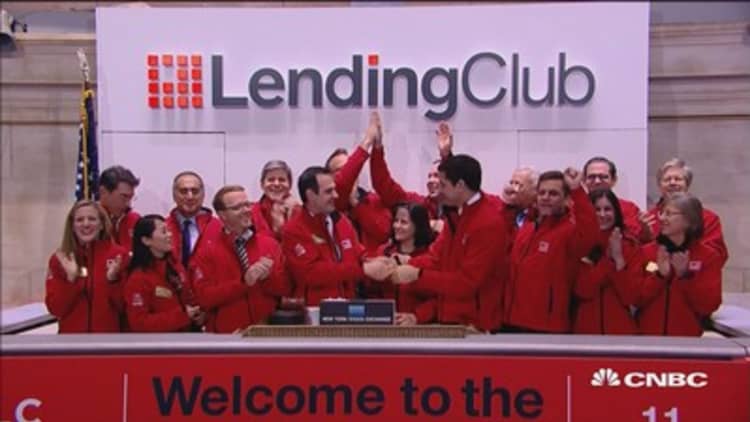LendingClub shook up the finance industry by creating an online marketplace to connect borrowers and lenders and using sophisticated technology to underwrite and service loans. The model propelled LendingClub to an IPO in December and a market value that sits near $7 billion.
Now a younger start-up headquartered a half-mile from LendingClub on San Francisco's Mission Street thinks it can apply that crowdfunding formula to equity. (Tweet This) But there's one thing missing: Evidence the strategy will work.
CircleUp spent the past three years building a marketplace to link hungry investors with small consumer businesses that want to raise about $1 million. The company's pitch is that in the consumer packaged goods market, there's been no efficient way for investors to find early-stage brands. Winemakers, clothing companies, Indian restaurants, Kombucha tea brewers and other young companies with $1 million to $10 million in annual revenue have a new option that doesn't require turning to a costly bank loan.
Read MoreFunds rush to pour money into online lending
Like LendingClub, CircleUp registered as a broker-dealer, which enables it to take a cut of about 5 percent every time a company raises money on its site. For a $1 million round, CircleUp banks $50,000. And both companies have developed algorithms to judge applicants and predict success. In January, CircleUp added LendingClub Chief Operating Officer Scott Sanborn to its board of directors.
And some of the same venture investors who backed LendingClub are ponying up for CircleUp, including Canaan Partners, Union Square Ventures, and Google Ventures (LendingClub raised money from Google's later-stage investing arm).
"Making the investing process easy, efficient and much more emotionally resonant is something LendingClub has done extremely well and something CircleUp is doing extremely well," said Dan Ciporin, a general partner at Canaan Partners and CircleUp board member who invested in LendingClub in 2007. "CircleUp is enabling people to access an entirely new asset class."

LendingClub does have a track record—albeit a short one. It has funded $9.3 billion in loans, primarily for debt consolidation at interest rates much lower than credit cards. Net revenue last year more than doubled to $211.1 million on $4.4 billion of originations.
Investors on the service—ranging from small-timers using their brokerage account to multi-billion dollar financial institutions—have done well so far, generating average returns of 5 percent to 9.7 percent a year. Every time a borrower pays, investors make money.
Equity, however, is a different animal, industry pros point out. Early-stage companies are inherently risky, and even the best ones can run into problems should the economy turn south or a larger brand become a fierce competitor.
Read MoreWhat do rising rates mean for online lenders?
With an eclectic mix of beef jerky makers, organic food markets and toothbrush manufacturers raising money on CircleUp, investors can only hope they're putting money behind good products and talented teams. To profit, they need to see liquidity events like acquisitions or the occasional initial public offering.
That hasn't happened yet among the 103 business that have closed financing rounds on CircleUp. "It's so hard to know which platforms are going to win," said Peter Renton, publisher of industry blog Lend Academy and co-founder of the annual LendIt Conference. "It's going to take a long time to see who is best at identifying tomorrow's winners."
Read MoreHow LendingClub aims to end banking as we know it
For consumer start-ups that find a niche, there's plenty of money to be made. According to PricewaterhouseCoopers, transaction volume in the retail and consumer sector for deals at $50 million or more surged to a five-year high of $194.5 billion in 2014. That includes megadeals like Reynolds American's $27.4 billion purchase of Lorillard, as well as $4.5 billion worth of IPOs.
With the crowdfunding market blowing up, CircleUp isn't the only place for emerging businesses to raise capital online. The site faces competition from Crowdfunder and MicroVentures.
The way CircleUp sees it, the challenge isn't so much about the competition as it is picking the right companies.
To do that, CircleUp invested heavily in algorithms designed to filter out all but the highest-quality applicants. A manual process whittles the field down further, so that ultimately fewer than 3 percent of companies get accepted, based on growth, profitability, strength of the executive team and attractiveness of the product to potential acquirers.
Read MoreWall Street mania propels Prosper to $2 billion valuation
The seven businesses that raised money on the site in 2012 are growing revenue 21 percent a year, while the 38 that closed their rounds last year are recording 94 percent growth on average, according to CircleUp's data.
Co-founder and CEO Ryan Caldbeck says the site is still likely 18 months away from seeing some of its early companies produce returns given how young they are and the history of consumer packaged goods companies.
Until that happens, comparisons to LendingClub are premature. "LendingClub cared a lot about investor returns, and you saw that in the curation they did and the work they did to score loans," said Caldbeck, who worked in private equity before starting CircleUp in 2012. "One of the key reasons they've been successful is because investors have made money on the platform."
Caldbeck added that several companies, which he didn't name, received acquisition offers, and some investors have had the opportunity to sell in follow-on financings.
Another big difference between LendingClub and CircleUp is the sources of capital. LendingClub got its start as a true peer-to-peer service, creating a structure that let any retail investor put money into online loans. Over time as returns proved to be high and predictable, hedge funds and giant money managers rushed in.
CircleUp is only available to accredited investors, which generally means individuals with at least $1 million in net worth (not including the value of their home), as well as institutions and family offices.
There's a lot of schlocky, high-priced stuff out there that people are peddling.John Foraker, president of Annie's
John Foraker, the president of packaged foods maker Annie's, is betting big on the CircleUp platform. He's used some of his wealth from Annie's, which was bought last year by General Mills for $820 million, to back close to 10 companies on CircleUp at $50,000 to $200,000 a pop. Tea producer Bhakti Chai and Three Twins Ice Cream are among his investments.
It's the only place Foraker knows of to find a vetted list of early-stage consumer companies and also see selected financial information, so he can make comparisons and see who else is investing. "I view those kinds of investments as high risk, high return," said Foraker. "The fact that they curate is really important because there's a lot of schlocky, high-priced stuff out there that people are peddling."
Read MoreCrowdfunding for start-up consumer companies
Thirty-five or so companies are coming onto CircleUp every month, aiming to bring in a total of about $40 million, and about half of them will successfully raise on the site. Green Zebra Grocery, a health food store in Portland, Oregon, just closed a $1.5 million round on CircleUp.
Tava Indian Kitchen, a fast casual restaurant that looks like Chipotle for Indian food, recently closed a $4.5 million financing round, with about one-third of the capital coming through CircleUp. (Caldbeck's brother, Justin, is among Tava's CircleUp backers.)
Tava is a popular place. On a Thursday in late April, a line 25 people deep extended outside of the downtown San Francisco location, one of three Tava restaurants in the Bay Area. Inside, lunching on a lamb and daal rice bowl, Tava CEO Jeremy Morgan is mapping out his plan to grow to 10 regional spots in the next two years and then go national.

Morgan is no industry novice. He was previously the marketing chief at fast-growing chain Smashburger and also worked in private equity. Through CircleUp, Morgan met some new investors, but just as valuable to him is the software that enables him to manage deal flow, track correspondence and cut down on all the tedious back-and-forth emailing.
"Their back-end platform is incredibly convenient for helping close things out," Morgan said. "It's a nice consolidating factory for all the really awful back-end legal work, bookkeeping things. I didn't have to chase people around and email documents all over the place."
Companies can set the minimum and maximum investments from any one firm or individual. The smallest check size Tava would accept was $40,000.
Read MoreSmashburger's smash technique
For some investors, who want access to the overall asset class, putting that much money into any single business is too risky a proposition. Again, the LendingClub playbook came in handy. LendingClub established a unit called LC Advisors for investors who wanted to put money into a portfolio of loans. Similarly, CircleUp created a $20 million fund last year that acts as a basket of stocks across the site.
That's how Brendan Ross is investing on the platform. Ross is president of Direct Lending Investments, a Los Angeles firm that buys into small business loans. For his firm, Ross invests exclusively in fixed-income assets, but after hearing about the CircleUp fund, he and a friend pooled $500,000 of personal money to buy a piece of it.
"This is the first private equity investment for me as I think it will be for many of the people that find themselves attracted to CircleUp," said Ross. By doing so much due diligence, "they're taking a lot of risk out of the equation."
Read MoreTracking equity crowdfunding
Still, the vast diversity of businesses on CircleUp makes it difficult to predict returns.
Unlike, LendingClub, which gives investors an upfront and accurate estimate on how much they can expect to make annually, an unpredictable event could kill a mom-and-pop shop in Nebraska or jewelry retailer in Texas.
"With an equity-based platform, you're chasing deals," said Jason Fritton, CEO of Patch of Land, a crowdfunding platform for real estate. "You're investing in somebody's concept or idea."
The challenge ahead for CircleUp is proving that its algorithms can consistently pick the winners.


